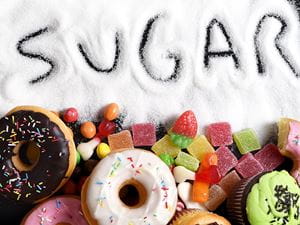
There is a story about a little boy during the 1930's who was just addicted and obsessed with eating sugar. Even then, people knew that sugar in excess was not healthy. Rightfully to be concerned, his mother tried everything to help her son let go of his love of sugar. At her wit's end, she sought out Mahatma Gandhi to talk with the boy. The story goes that once they reached Gandhi, they were turned away and asked to return 1 week later. When they returned the boy was told by Gandhi to stop eating sugar and he did. But why didn't Gandhi say that in the beginning? “I was not qualified to advise the boy? At that time, I too was eating lots of sugar," the teacher said. Basically, if you want to change something you have to be the change. Like anything else, if you want to lose weight and be healthy you need to make lifestyle modifications. The boy in the story had an appetite built around sweets-- he probably didn't need to go a diet, but he was headed in that direction. Sugar is an ongoing problem and will derail any weight-loss plan when it goes unchecked. It is a problem that is common worldwide and in America.
Refined flours, crackers, granola, white bread, pasta, coffee creamers and alcohol are digested fast and converted into sugar. Dr. Mark Hyman explained that fat doesn’t make you fat, sugar is the true culprit. Fat makes you full, balances your blood sugar and is necessary for fueling your cells. Along with protein, have good fats at every meal and snacks including nuts and seeds. How do we reduce this sugar? Are you ready for this? It means scaling back frappuccinos, fries, burgers, cookies, cakes, packaged meats like bacon and other convenience foods. If you want to lose weight, you need to reduce your consumption of these. They are also low in fiber and will make you hungry again. When you eat certain foods that contain a lot of sugar and carbohydrates, they get broken down into sugar, this sugar gets dumped quite quickly into your bloodstream.
How do we wean ourselves off of sugar? First, we need to do it slowly or we will crash. It's like when you stop your caffeine intake, sugar is the same way and it can result in headaches if you do it cold turkey. The reason is because there will be a change in the blood sugar and it could leave you feeling jittery. Then you will grab something quick to feel better. Also, it will be less of a shock for you taste wise. Start by reducing the amount of sugar you’re putting into your coffee and putting into your tea in morning. Decrease sugary drinks that you consume like juices and opt for more water. Try drinking the recommended 4-5 glasses of water daily to help keep your body running at its optimal level and to flush out toxins. Try reducing the amount of sugar in your cooking recipes by half. Avoid the natural sugars like coconut sugar and honey. Try this and work up to a 30-day sugar detox. There is a caveat to this. You need to replace sugar with eating more protein. Adding a higher protein diet may help you cut back on sugar and late-night eating by 441 fewer calories per day. The American Journal of Clinical Nutrition found that an increase in dietary protein from "15 percent of energy at a constant carbohydrate intake produces a sustained decrease in ad libitum caloric intake that may be mediated by increased central nervous system leptin sensitivity and results in significant weight loss."
Besides protein, eat more berries like blueberries, strawberries and raspberries. These gems are packed with vitamin A, vitamin C and vitamin E. They give you that boost in energy without the fallout. Also, they won't harm your diet. But don't forget your vegetables. Eat more tomatoes, carrots, kale, spinach, broccoli, sprouts and bell peppers for an extra boost. Eating more fiber will help you reduce sugar cravings. Soluble fiber is converted stays in the digestive tract for a long time. "It reduces the amount of food that an individual takes within a day preventing weight gain due to excess food," Beliefnet offered. Outside of eating better, pay attention to your food labels. Scan labels before you add it to the food cart. Taking the time to find out how much sugar is in your instant oatmeal, for example, will help revamp your shopping list. The amount of sugar in foods you thought were sugar safe zones are actually not. With the case of the instant oatmeal, if it has a flavor it can have 12 grams of sugar per individual package.
Sneaky sugar may have been the offender all along in your weight-loss journey. By swapping out sugary foods for healthier choices you will not only lose weight, but you may reduce the risk of heart attacks, reduce the risk of strokes and reduce the risk of diabetes. There is more to reducing your sugar intake. It may minimize fatigue! Cutting back on the amount of sugar just became sweeter.

